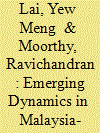|
|
|
Sort Order |
|
|
|
Items / Page
|
|
|
|
|
|
|
| Srl | Item |
| 1 |
ID:
185901


|
|
|
|
|
| Summary/Abstract |
Japan and Malaysia established relations in 1957, the year Malaysia obtained independence from the British. Malaysia has largely benefited through many Japanese assistance programs, and in return, the country has remained one of Japan’s closest friends in Southeast Asia. During his first premiership, Mahathir introduced the Look East Policy (LEP) as a major foreign policy re-direction, moving away from the Western approach adopted by his predecessors. Nevertheless, bilateral relations plateaued during the reign of the two successive prime ministers Abdullah Badawi and Najib Razak primarily as a result of the changing regional geopolitical landscape. Malaysia moved closer towards an emerging China. However, the May 2018 general election paved the way for Mahathir to resume control of the country for the second time after a lapse of 15 years. Within less than a year, Japan started to bounce back in Malaysia’s political and strategic sensors. Japan is set to play a greater role in the Malaysian economic landscape, especially with its assistance of low-interest samurai bonds to aid the debt-stricken new Malaysian government. For Japan, this rekindling of old friendship could not have been more timely and may translate into greater support to Japan’s initiatives for regional peace and for a free and open Indo-Pacific region. This paper examines the evolving trends in bilateral relations between Japan and Malaysia in the second Mahathir administration. More specifically, it explicates the external and domestic sources which have affected and recalibrated Malaysia’s Japan policy in the context of a shifting regional strategic milieu as well as an evolving post-election domestic political landscape. This paper contends that the emerging dynamics and trajectories in Malaysia’s relations with Japan under the nascent “Mahathirism 2.0” period have been primarily shaped by the country’s ruling elite’s perceptions of her external conditions in the context of East Asia’s changing power dynamics, tempered by their domestic political considerations and leadership traits/idiosyncrasies. It further argues that despite the newly-minted Pakatan Harapan (PH) government’s visible foreign policy adjustments indicating a possible shift of emphasis from China towards Japan, such recalibrations are yet to alter the fundamentals of Malaysia’s Northeast Asia policy generally and its Japan policy specifically, an area in which the effects of structural conditions (proximity, power asymmetry, rivalries and uncertainties) continue to be informed by the Malaysian ruling elite’s domestic political considerations as they strive as much to optimize the country’s external interests as to consolidate their domestic legitimation.
|
|
|
|
|
|
|
|
|
|
|
|
|
|
|
|
| 2 |
ID:
187450


|
|
|
|
|
| Summary/Abstract |
This paper adopts a two-level model to explain Malaysia’s forward diplomacy toward the Northeast Asian states, the larger economies beyond its immediate neighborhood of Southeast Asia. We contend that while such structural conditions as power dynamics drive and constrain the smaller state’s agency toward the Northeast Asian nations, their effects are filtered by domestic politics, specifically the ruling elite’s pathways of legitimation. The findings highlight that while diplomacy is almost always motivated by the imperatives of immediate reality and identity, there is a different genre of driver, that of nurtured necessity. This paper illustrates how Malaysia’s outlook toward the Northeast Asian states—and its resulting active and anticipatory diplomacy—has been more “discovered” than determined and why such diplomacy has been driven more by the elite’s domestic political needs than the idiosyncrasies of its leaders.
|
|
|
|
|
|
|
|
|
|
|
|
|
|
|
|
|
|
|
|
|